Can Childhood Trauma Impact Your Personality Type?
When it comes to helping people with their personality type I’ve started to veer further and further away from the use of tests and indicators. This is mainly because there are so many factors that can impact how questions on indicators are answered. Environment, upbringing, trauma, mental illness, stress, looping, all these things can impact the result you get on a personality indicator or test.
One of my readers asked me several months ago to write an article about how childhood trauma might impact someone’s type result. I thought this was an excellent question, but I’ve needed time to ponder, research and talk to other typologists to see what they think.
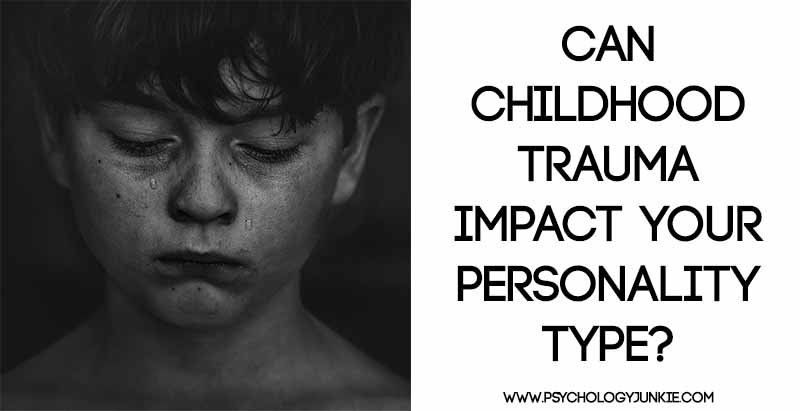
Not sure what your personality type is? Take our new personality questionnaire here. Or you can take the official MBTI® here.
Childhood Trauma Can Definitely Impact Your Personality Type Result
While childhood trauma won’t change your personality type, it can change the result you get on a type indicator (personality quiz, the official MBTI®, etc,.). One of the reasons this happens is that trauma can impact how you use, develop, and show your type preferences. Most tests and indicators look for “typical” type responses, behaviors, and reactions. They aren’t able to consider the effects of abuse, environment, and stress.
For example, an ENFJ who has grown up in an abusive, volatile environment and wasn’t nurtured through childhood may not be as socially conscious or in tune with the feelings of others as your typical ENFJ. Questions determined to root out healthy Extraverted Feeling (the dominant function of ENFJs) might fall flat for this kind of an ENFJ. Why? Well, studies in neuroscience have shown that children who aren’t nurtured or who are maltreated as children can experience a number of changes in their brain structure and chemical activity which will affect their behavior and social and emotional functioning.
“Toxic stress can alter brain development in ways that make interaction with others more difficult. Children or youth with toxic stress may find it more challenging to navigate social situations and adapt to changing social contexts (Hanson et al., 2010).” – Understanding the Effects of Maltreatment on Brain Development
An ENFJ who is recovering from a severely abusive or neglectful childhood might seem more withdrawn and introverted, and they might seem less aware or concerned with social constructs and the feelings of others. As a result, they could walk away from a personality test with a completely useless and inaccurate type result.
When it comes to personality typing, we can’t downplay the importance of neuroscience, background, environment and trauma. If I’m trying to type someone who is a child abuse survivor and who is struggling with PTSD I need to be ready for behavior and answers to questions that might be the result of coping mechanisms and not the result of their own inherent type.
My Own Experience
As a rape and abuse survivor who has been diagnosed with PTSD for most of my adolescence and adulthood, I know that stress, mental illness, and anxiety can have a major impact on how I display my own type. INFJs aren’t supposed to be especially drawn to past experience, but sometimes, because of PTSD, that experience pulls me back into its grasp. When I’m in the midst of anxiety and stress I can behave much more like an unhealthy ESTP than a healthy INFJ. Sometimes I lack the social grace and awareness that would be typical for an Extraverted Feeling type. During my darkest days I’ve lacked the visionary outlook on the future that is typical for Introverted Intuitive types. Does that mean I’m not an INFJ? No, but it does mean there have been times in my life where I certainly haven’t acted like your “typical” INFJ.
How Childhood Trauma Can Cause You to “Loop”
Sometimes when we become extremely defensive of ourselves or there’s a truth that we can’t accept (perhaps the truth that we were unloved or neglected) we can try to protect our psyche by entering a dominant-tertiary “loop”. This is where your dominant and tertiary functions loop back and forth, effectively bypassing your auxiliary function.
For example, an ESFP who has had their values violated through much of their childhood might try to suppress their auxiliary Introverted Feeling and loop back and forth between Extraverted Sensing and Extraverted Thinking. When this happens, this type is much more likely to get an ESTJ or an ENTJ result on a personality test.
In the same way, an ENTP who is stuck in a loop can cycle back and forth between Extraverted Intuition (Ne) and unhealthy Extraverted Feeling (Fe). This can make them seem more emotionally manipulative than a typical ENTP, and that tertiary Fe might give them a bent towards an “FJ” result in a personality test.
How Stress Can Impact Your Type Result
When you’re extremely stressed or depressed, you can get stuck “in the grip” of your inferior function. In most people, the inferior function is less conscious and less recognizable than the dominant or auxiliary function. But in people who are highly stressed or depressed, they might revert to using their inferior function more frequently. This can cause, as in my case, an INFJ to seem more like an unhealthy ESTP. It can cause an ENTJ to seem more like an unhealthy ISFP. You can find out more about how stress impacts your personality type here.
Children who have been abused or traumatized during their childhood are much more likely to experience stress, depression, or PTSD as adults. This can cause them to exhibit more “grip” behaviors than if they were in an emotionally healthy place. As an example, I’ve known several INFPs who tested as ESTJs because they were in a constant state of stress, anxiety and overwhelm.
How to Avoid Being Mistyped
– If you’re really wanting to take an indicator to define your type then try to answer the questions when you’re in a positive frame of mind.
– Take into account that the reason you may be hyper-vigilant, anxious, or on-edge might be related to stress and not your type. Think of behaviors and thought patterns that might be influencing you based on that. Read up on stress reactions and see if those might play a part in how you are expressing your type.
– Get familiar with the cognitive functions. If you read good descriptions of these and can determine which ones you favor in your happiest, most relaxed states, you’ll be less likely to mistype yourself.
– Talk to an MBTI® practitioner who is familiar with neuroscience and psychology who can give you a more multi-dimensional approach to finding your type!
What to Look For in the Future
I am going to be working on a series of posts about the different levels of health for each personality type. If you don’t relate to the “generic” type descriptions, you might find yourself able to identify with the types when they are described by their various health levels. So stay tuned!
What Are Your Thoughts?
Has your childhood had an impact on your personality type or your results? Share your thoughts with us in the comments!
Find out more about your personality type in our eBook, Discovering You: Unlocking the Power of Personality Type.
Other Articles You Might Enjoy:
The Learning Styles of Every Myers-Briggs® Personality Type
What Your Child Needs to Hear Based on Their Myers-Briggs® Personality Type
How Each Myers-Briggs® Type Can Feel Lonely (And What to Do About It!)
The Teenage Struggles of Every Myers-Briggs® Type
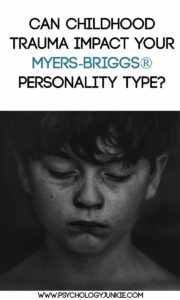
Get Your Free eBook!

Subscribe to our newsletter and get an eBook packed with powerful parenting tips for each personality type! Enjoy 28 beautifully illustrated pages exploring the needs and strengths of all 16 personality types in childhood.

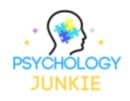
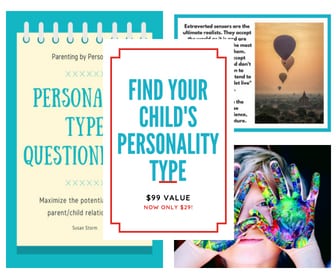
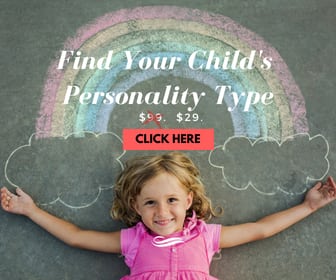





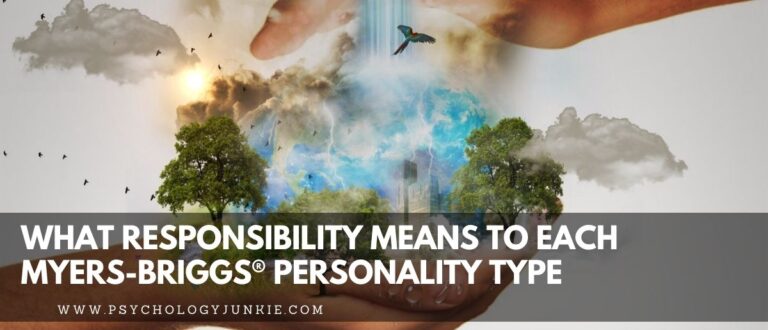
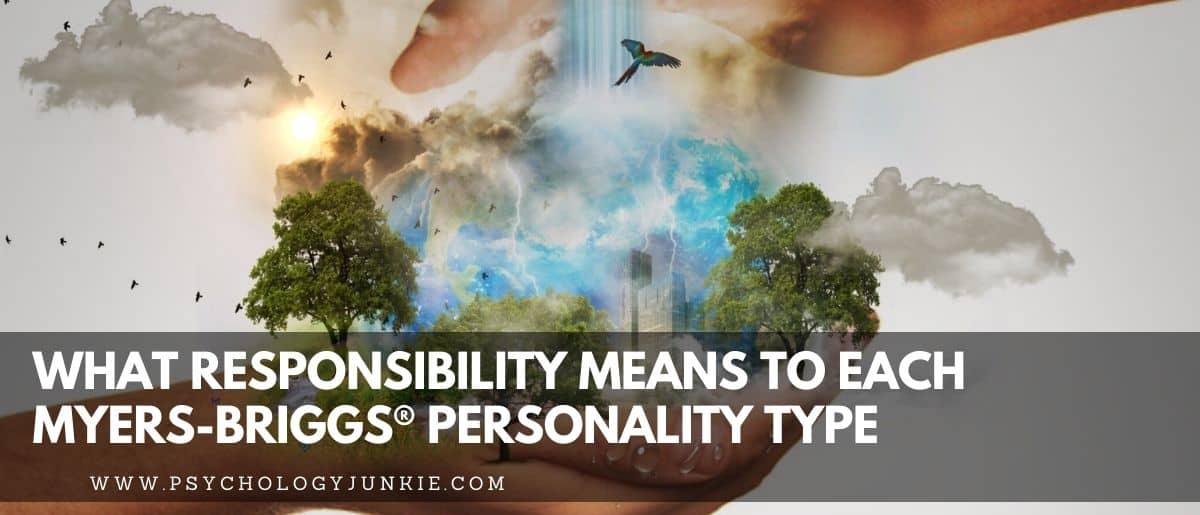
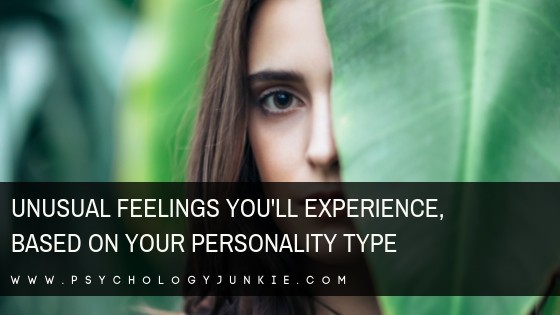


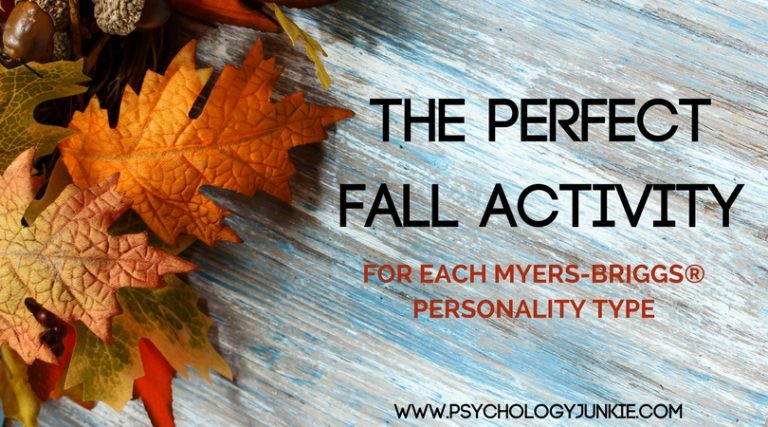
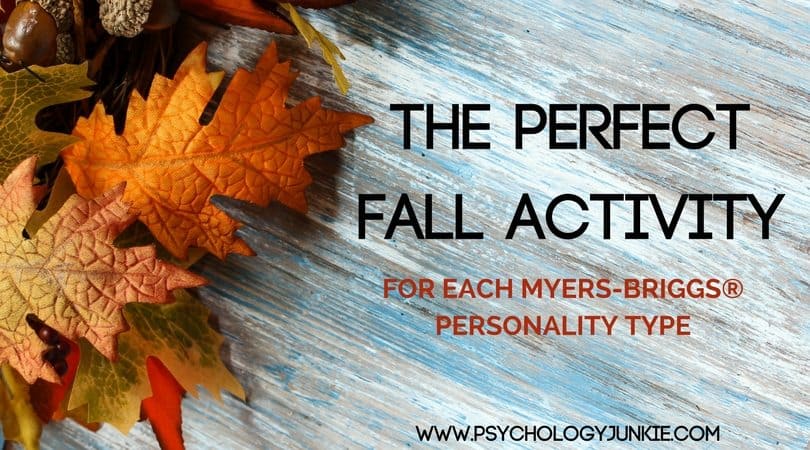
Well I don’t know if anybody will care but in case it could be useful to someone! 😀
It took me a very long time to figure out the “four letters” of my personality type. Well at least, I think I have found out my four cognitive functions. I still don’t really which personality type (ENFJ or INFJ?) exactly but for me, it’s not really that important. What I do know is that I’m probably unlikely to be INFP.
As a child, I was surely shy and sometimes daydreaming. But I was also very easy-going and (too) accommodating. My mum used to scold me for giving my stuff to other children in the class for example. I was always looking for a good group of friends, pleasing and being nice to everyone. Other times, I was quite stubborn and trying to draw people into joining a cause. I went as far as building a little environmental group when I was about 11.
Then when my father suddenly passed away, it was a huge shock for me and my family. All the harmony was just shaken up. And after reading about MBTI types and grief, I understood what happened to me. I only wanted to show to my family that I was strong and not that I was suffering. In fact, I was completely oblivious to my own needs. When I entered the first grade of high school the same year, I was more interested in finding new friends than in dealing with my own problems. This was the beginning of hell. I was shunned by my peers at school, misunderstood by my family (probably because I wasn’t opening up).
I quickly withdrew from any social life. From having many friends in elementary, I ended up with no friends in high school. At “best”, I was taken advantage of by other people who told me they were my “friends”. Then at some point, I started building myself defenses against the world. I was “independent-minded”, i needed nobody. I started being interested in finding “who I am”. When I came across the MBTI test during my teenage years already, I tested as an INFP, which is what I believed I was. Now, I understand why I repeatedly got “INFP”.
I went on with my life. I went abroad for some time, went to college. I met the man who’s now my boyfriend, I made new friends who were actually nice. And I realized there was something off with the fact that I would be INFP, even though I didn’t want to admit to myself at first. I discovered the cognitive functions and I was just more lost than ever. I felt I had more Fe than Fi but also more Se than Si (I love food so much). What about the Ne then, especially if I was always jumping from one idea to next? Well it took me a very long time to understand this but an ENFJ or an INFJ could have very well some Ne. The thing is to wonder whether it’s “healthy” for oneself. Having so many possibilities is actually too overwhelming for me, I prefer to have one plan where I can direct myself to.
What happened is that the trauma made me slip into someone (INFP) I was not. And I’m only starting to realize that now, as I’m slowly but surely getting on with my life. If someone out there has been in the same situation as me, don’t lose hope, it only gets better.
I appreciate this comment, thanks for posting! I see some similarities between your experience and mine — very popular in elementary school, then completely shut down in high school after transferring, which is certainly traumatic, but funny enough, wasn’t the bigger trauma, which was happening at home my entire childhood. Looking back, I think I dissociated from myself entirely and denied the obvious truth of the abuse I was enduring. While I didn’t have any close friends in my “new” high school, I had one friend from my previous high school who I hung out with on the weekends. In school however, I just made sure my makeup and clothes were perfect and kept my mouth shut, hoping not to rile up any predator who might target me for bullying. It actually worked, but it was a lonely, isolating experience that in some much smaller ways mirrored my home life. I’m still working on getting over the home life trauma, as the dissociation from my experience and enmeshment with my abuser parent lasted well into adulthood. Without that headspace ever allowed in order for me to face the truth of my upbringing and family, and thus begin healing, I was doomed to live as a shell. I used to think that healing was all about finding my way back to me, and that’s part of it, but I now see that it’s also about finding a way forward as me, whoever she is. As I read recently somewhere, our MBTI may be what we are, but it isn’t who we are, and I would add that when who you are is the recipient of long-standing abuse of many kinds starting in infancy, it casts a long shadow over yourself so that the truth of what and who you are takes serious study and commitment. It’s no wonder that some such as me type as INFP, as healthy, authentic INFPs are naturally drawn to intense self-study and personal development as they encounter and entertain so many possibilities about who they can be to live a fulfilling, meaningful life. The tip-off for me though was reading about Ne and realizing that I don’t enjoy exploring and exhausting numerous ideas as much as I naturally home in on what my essence really is residing inside me already, albeit somewhat stubbornly obscured by internal noise.
I would echo your encouraging words to others not to lose hope if they feel a similar lostness, if that’s a word. Keep striving, but be patient with yourself. You’re worth the wait.
Thank you for writing this article and sharing your wisdom with the rest of us who are survivors. I last year came to realise that what had happened to me during my school years was sexual assault, and was not my fault. I’ve been using typology to try and explore myself, on how I can be the best version of myself and relate better to others. Although my journey has been very confusing, with me going from being convinced I was either INFP or INFJ, to now wondering if ISFJ or even ISTJ fits better. I know I am a Ne and Si user rather than Ni or Se. So I guess I made progress.
Anyways . I’ve found it hard to see myself “from the outside”, since I have quite low self esteem and don’t trust my own understanding and insights. Though I had some counselling earlier this year to address my trauma and trust issues. I’m not “fixed”, and I’m still very anxious socially. But I know now it wasn’t my fault and that it’s actually perfectly normal for me to have trouble figuring out my own type…yeah I’ve felt so foolish for not knowing with confidence my type.
I did take the MBTI test and scored INFP however I have been video typed by a few practitioners; one seen me as ISTJ, the other as ISFJ, and as INFP. So I do feel really ambiguous and fake; like I’m deceiving people.
So it was really comforting to read this article and get an explanation as to why my type seems to elude myself and others. Thank you for speaking up, as a fellow survivor and as a guiding light for typology 🙂
For anyone who has suffered trauma, particularly child abuse, I recommend reading “The Body Keeps the Score” by van der Kolk. Be warned however, that this book is, as you might imagine, quite triggering. I was perpetually shellshocked all over again for weeks after finishing it over a month’s span.
I also bring up this book because something very illuminating was touched upon in it: In formal psychological practice as we know it, there was a shocking lack of acknowledgment of the pervasiveness of child abuse, even well into the 20th century. I wonder to what extent this glaring omission in psychiatric circles shaped Jung’s theory of type, and by extension, Myers and Briggs development of the MBTI.
As for me, I’ve been typed as INFP as well by the official instrument after receiving two prior poor-fit results. I don’t think INFP is correct either, but the practitioner seemed to think as much, so I didn’t object. I can tell you that, out of everyone in my office who has been typed by the same practitioner, I relate the most to the ENFJs and INTPs, but I relate the absolute least to the ISFPs. I do think I was born an extravert with a feeling process, and I do know I can’t stand to be in conflict with someone, even people I don’t know well. Such a situation will make me literally lose sleep and figuratively tie myself in knots. I can’t be okay again until I know I am okay with those in my sphere, even people I don’t like. (Or until I’ve decided the relationship isn’t worth it.) As I’ve matured as an adult, I know it’s impossible and somewhat perfectionistic and counter-productive to expect people you don’t like to like you anyway.
Thanks for writing this, and thanks to those for reading and sharing!
This helps a lot. Initially right now I was trying to search ptsd and the possibility of finding the wrong enneagram type but realized this test could be useful as well. I think years ago i used to think i was enfp but more recently before i found things out about myself I have leaned more towards entj or Estj. I found out last year that I have had ptsd depression and anxiety my whole life and when I found out it opened a can of worms so to speak. I have always felt somewhat lost but when I found this out I realized I had no idea who I truly am. I’ve started to question if who I really am is hidden and hard to find (which is why idk which type for this test that I am or why Idk which enneagram type I am) because of the ptsd. It seems like PTSD can mask who a person truly is and cause them to think and do things only because of trauma they haven’t healed from. If they heal, who’s to say who they were before in their most unhealthy state, is who they’d be now in their most unhealthy state. I’m so confused and question if I’m ever gonna know who I truly am and it scares me. I don’t trust myself to pin point anything now that I know I have ptsd and feel like I’ve been faking who I am for as long as I have been alive. I feel like my real self has been hiding from.. myself. My ptsd goes all the way back to when I was 5. I’m not super old. I’m in my mid 20’s. But it’s causing a lot of confusion. Help. Anyone. I just wanna know if when a person has that condition, does it mask the real results? Like I stated earlier. Someone who is aware they have ptsd (ptsd I know doesn’t go away but we can heal from the traumas and learn to cope) can heal and really deep down be a completely different person once they’ve healed.
I have CPTSD from childhood traumas, abuse, and neglect. I have felt introverted my whole life, but my environment was so volatile growing up that expressing myself could’ve been dangerous at times.
I learned to be quiet and observant. At work now, away from my family, after over a year in trauma therapy, I am talkative (sometimes quiet still), and very interactive with the guests, and it is easy. Whereas before, I would never have even spoken to others. I can say I’ve had “imposter syndrome” where I felt fake around everyone, and I wasn’t doing it on purpose.
My emotions, and also my self expression, have been suppressed and repressed for so long, I didn’t know how to let the real me out with anyone.
Inside, I want to dance and sing like no one’s watching me. I want to play and be light-hearted.
I have felt a shift in myself. And that “wild inner child” wants to come out and enjoy life. To not be so on edge, to laugh and play with family and friends, to discover what life will be like when I’m not constantly looking at everyone through a trauma lens. I’ve had traumas since birth, of varying sorts, so this is all completely new for me.
It is truly like an unintentional mask is coming off. 🙂
Im.an esfp as you know esfps are fun loving,spontaneous and extremely charismatic. They love to enjoy nrw experiences and they dont like boting or repetitive tasks they get bored very eadily if something is not happening in their life.. so i was an extremely fun loving esfp. But when i was in 3rd grade,i got shifted to some other city and was not ready to accept the fact that im leaving my previous city, im leaving my old friends actually i was not prepared to change .. i wasn’t prepared to meet new people i oved my life so much that i wasn’t ready for change . And when i got shifted to a new city , i took much time to adjust, but something was wrong i became inferior and was not like i used to be before but somehow i managed during my childhood i adjusted with new people though having inferior intuitive. But when i reached 10th i m in stress and idk what to do
My sister had a very traumatic childhood event, made worse by a mother who had her own childhood issues. My sister is convinced she is an INTJ, but she demonstrates many non-intj behaviors. She is striving to be the perfect INTJ, but I worry that it is only compounding her discontent. How do I help her?
This article was more than helpful for me. I was diagnosed with c-ptsd due to a traumatic childhood. I am trying so hard to find my mbti type but I fail everytime. Although I’m using the cognitive functions, I literally have no idea what my coping mechanisms and what my personality traits are. I have a really high introverted sensing, but I’m quite sure that’s because I always need to feel safe and the only way for me to feel safe is to compare present situations with past ones. I also don’t know if I’m more emotional than I act deep down, because I’m scared to be vulnerable and always needed to suppress my feelings. Id really love to know my mbti type but at the moment I feel like it’s impossible. So thanks for telling me why.